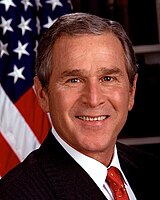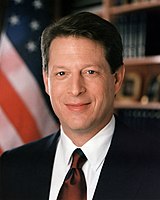2000 United States presidential election
The 2000 United States presidential election happened on November 7, 2000. George W. Bush, the Republican candidate who was the Governor of Texas and the eldest son of the 41st president, George H. W. Bush, won the election. He defeated the Democratic candidate, Al Gore, who was the Vice President.
| |||||||||||||||||||||||||||||
537 electoral votes (1 didn't vote) of the Electoral College 270 electoral votes needed to win | |||||||||||||||||||||||||||||
|---|---|---|---|---|---|---|---|---|---|---|---|---|---|---|---|---|---|---|---|---|---|---|---|---|---|---|---|---|---|
| Turnout | 51.2%[1] | ||||||||||||||||||||||||||||
| |||||||||||||||||||||||||||||
 Presidential election results map. Red denotes states won by Bush/Cheney(30), Blue denotes those won by Gore/Lieberman(20+DC). | |||||||||||||||||||||||||||||
| |||||||||||||||||||||||||||||
Incumbent Democratic President Bill Clinton was not eligible to serve a third term, and Vice President Gore was able to secure the Democratic nomination. Bush was seen as the early favorite for the Republican nomination, and despite a contentious primary battle with Senator John McCain and other candidates, secured the nomination by Super Tuesday. Many third-party candidates also ran, most prominently Ralph Nader. Bush chose former Secretary of Defense Dick Cheney as his running mate, and Gore chose Senator Joe Lieberman as his. Both candidates focused primarily on domestic issues, such as the budget, tax relief, and reforms for federal social insurance programs, though the foreign policy was not ignored. Clinton and Gore did not often campaign together, a deliberate decision resulting from the Lewinsky scandal two years prior.
Bush narrowly won the November 7 election, with 271 electoral votes to Gore's 266. There was a disagreement over who won Florida's 25 electoral votes because the way Florida voted was different from other states. A recount happened in the state and the uncommon event that the winner got fewer popular votes than the loser.[2] The Court's decision in Bush v. Gore announced on December 12, 2000, this ended the recounts, effectively awarding Florida's votes to Bush and granting him the victory.
Background
changeArticle Two of the United States Constitution says that for a person to be elected and serve as President of the United States, they must be a natural-born citizen of the United States, at least 35 years old, and a resident of the United States for a period of no less than 14 years.
Candidates for the presidency typically seek the nomination of one of the various political parties of the United States, in which case each party devises a method (such as a primary election) to choose the candidate the party deems best suited to run for the position. The party's delegates then officially nominate a candidate to run on the party's behalf.
President Bill Clinton was unable to seek re-election for a third term because of the Twenty-second Amendment to the United States Constitution, which states that a president may only serve up to two terms. His term as president ended at noon eastern standard time on January 20, 2001.
Candidates
changeDemocratic Party
changeNominees
change| Al Gore | Joe Lieberman | ||||||||||||||||||||||||||||
|---|---|---|---|---|---|---|---|---|---|---|---|---|---|---|---|---|---|---|---|---|---|---|---|---|---|---|---|---|---|
| for President | for Vice President | ||||||||||||||||||||||||||||
| 45th Vice President of the United States (1993–2001) |
U.S. Senator from Connecticut (1989–2013) | ||||||||||||||||||||||||||||
| Campaign | |||||||||||||||||||||||||||||
Withdrawn candidate
change- Bill Bradley, a former U.S. Senator from New Jersey withdrew on March 9, 2000 and endorsed Al Gore.
Republican Party
changeNominees
change| George W. Bush | Dick Cheney | ||||||||||||||||||||||||||||
|---|---|---|---|---|---|---|---|---|---|---|---|---|---|---|---|---|---|---|---|---|---|---|---|---|---|---|---|---|---|
| for President | for Vice President | ||||||||||||||||||||||||||||
| 46th Governor of Texas (1995–2000) |
17th U.S. Secretary of Defense (1989–1993) | ||||||||||||||||||||||||||||
| Campaign | |||||||||||||||||||||||||||||
Withdrawn candidates
change-
Senator John McCain of Arizona (Withdrew on March 9, 2000)
-
Businessman Steve Forbes of New Jersey (Withdrew on February 10, 2000)
-
Publisher and author Pat Buchanan of Virginia (Withdrew on October 25, 1999)
-
Senator Robert C. Smith of New Hampshire (Withdrew in October 1999)
-
Businessman Herman Cain of Nebraska (Withdrew early in campaign)
References
change- ↑ "Voter Turnout in Presidential Elections". Presidency.ucsb.edu. Retrieved August 18, 2016.
- ↑ "2000 Presidential General Election Results". transition.fec.gov.

